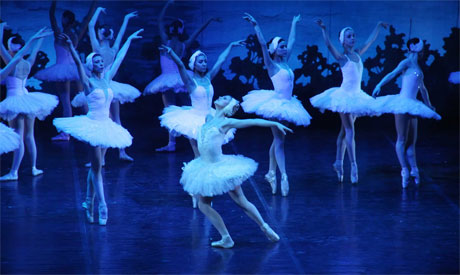
Cairo Opera Ballet Company in a scene from Swan Lake, choreography: Pepita, Ivanov, Bourmeister and Abdel Moneim Kamel. (Photo: courtesy: Cairo Opera House)
Commemorating Abdel Moneim Kamel on Sunday 21 April, the Cairo Opera House prepared a special evening of performances of his many works for the ballet and soloists. Kamel passed away on 25 February 2013.
The short documentary movies screened in between the consecutive numbers that presented Kamel as renowned Egyptian dancer, director and chairman of the of the National Cultural Centre (Cairo Opera House) between 2004 and 2011.
The Cairo Opera Orchestra performed under three batons, conducted consecutively by Nayer Nagui, Hisham Gabr and Sherif Mohie El-Din. The Cairo Opera Choir with choir master Aldo Magnato joined a few numbers. They brought to the audience works that bore the personal imprint of Abdel Moneim Kamel.
The evening also included renowned Egyptian soloists: pianist Ramzi Yassa, who played Chopin's Scherzo no 2, Op. 31 on piano; flautist, and current chairperson of the Cairo Opera House, Ines Abdel Dayem performed Rachmaninov's Vocalise on flute; while violinist Osman El-Mahdy performed "Meditation" from Thais by Massenet.
Soprano Iman Moustafa sung "Vilja Lied" from The Merry Widow operetta and soprano Mona Rafla treated the audience to "Je dis rien ne m'epouvante," Michaela's aria from the opera Carmen.
All the soloists from the Cairo Opera Company - soprani Iman Moustafa and Mona Rafla, mezzo-soprano Jolie Faizy, tenor Walid Korayem, baritones Mostafa Mohamed and Emad Adel and bass baritone Abdel Wehad El-Sayed – joined in Verdi's "Triumphant Scene" from Aida's finale of Act II.
Directed by Kamel, opera Aida was one of the late artist's biggest prides. His version of Aida has been performed several times on the Cairo Opera House stage and in front of the Giza Pyramids. In 2008, it also travelled to Beijing, as part of a rich artistic exchange between Egyptian and Chinese artists. Commenting in one of the interviews, Kamel underscored that though Aida is very stage-bound, he decided to infuse it with a variety of "multi-dimensional backdrops, dancing and props to create visual movement and to intensify audience interaction." The Cairo Opera Ballet Company joined in the many choreography elements, completing the rich image of this operatic icon.
The second half of the evening, the Cairo Opera's stage was given completely to the Cairo Opera Ballet Company, which is Kamel's absolute creation.
Following his unprecedented success in Egypt in the 1960s – during an era when the art of ballet was a shining star on the Egyptian firmament – Kamel's skills found great recognition on the international stages, including then Soviet Union, Germany and even the Italian La Scala.
Kamel returned to Egypt in the early 1980s finding that the arts scene had changed drastically and the Cairo's ballet, which back then was linked to the Academy of Arts, was in a deplorable state. Supported by his wife, Erminia Kamel, it took Kamel a few years to rebuild the basis of the troupe. Paralleling the strong backbone of the Cairo Ballet Company's artistic recovery, Kamel managed to incorporate the troupe under the new Cairo Opera House (which opened in 1988) and changed its name to the Cairo Opera Ballet Company.
But the change was not reflected only in name, as the troupe kept growing artistically, and soon started being recognised on the regional and international arenas. The internationally-renowned choreographers, such as Joseph Russillo from La Scala, Lorca Massine, not to mention Maurice Bejart, among many others, have worked with the company. In his turn, Kamel, as director, brought the many renditions of the known ballet gems, infusing the performances with his unique vision.
The second half of the concert commemorating Abdel Moneim Kamel reminded the audience of the several ballets who Abdel Moneim Kamel revived or created with his own hands. Scenes from the ballets performed by the company's soloists represented small shots of the history of the artist and his invaluable input towards the Egypt's cultural scene.
Lorkiana and Le Corsaire were directed by Kamel, while his choreography additional touches were seen in Swan Lake. Oriental Steps, El Leila Kebira and El Nil – performed during the evening – were completely choreographed by Abdel Moneim Kamel, in some cases co-choreographed with Erminia Kamel.
Abdel Moneim Kamel passed away on 25 February 2013. His contribution to the country's arts scene grew by the year and took him from the directorship of the Cairo Opera Ballet Company to the chair of the entire Cairo Opera House (2004-2012).
The evening was directed by Hisham El-Tally, with Erminia Kamel as its artistic director. A touching compilation of numbers for musicians, soloists, the Cairo Opera Company and the Cairo Opera Ballet Company is an important testimony to the artist who left an important imprint in Egypt's arts scene and who left behind generations of dancers filled with a passion for dance along with countless artists, who remember long years of dynamic cooperation with him.
Short link: